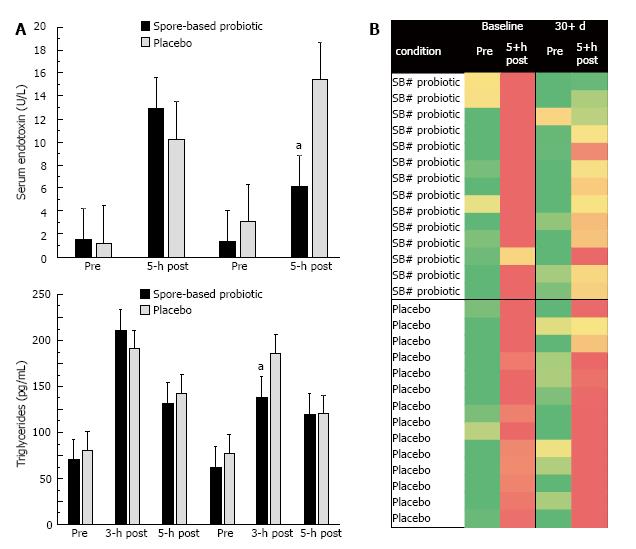Copyright
©The Author(s) 2017.
World J Gastrointest Pathophysiol. Aug 15, 2017; 8(3): 117-126
Published online Aug 15, 2017. doi: 10.4291/wjgp.v8.i3.117
Published online Aug 15, 2017. doi: 10.4291/wjgp.v8.i3.117
Figure 3 Serum endotoxin (A) and triglyceride (B) response to consumption of a commercially available high-fat, high-calorie pizza meal.
aP < 0.05 indicates significantly less than placebo, less than pre-meal, less than and same time point at baseline. Venous blood samples were collected following an overnight fast and abstention from exercise. Serum samples were analyzed using an automated chemistry analyzer. Subjects consumed an oral probiotic supplement for 30-d and the experimental meal challenge was completed at baseline and following the 30-d supplementation period. Probiotic responses were compare to placebo. Panel C demonstrates individual variability in the dietary endotoxin response prior to and after the 30-d supplementation period. Red indicates a large dietary endotoxin response (> 5 fold increase from pre-meal) and green indicates a small dietary endotoxin response (< 1 fold increase from pre-meal).
- Citation: McFarlin BK, Henning AL, Bowman EM, Gary MA, Carbajal KM. Oral spore-based probiotic supplementation was associated with reduced incidence of post-prandial dietary endotoxin, triglycerides, and disease risk biomarkers. World J Gastrointest Pathophysiol 2017; 8(3): 117-126
- URL: https://www.wjgnet.com/2150-5330/full/v8/i3/117.htm
- DOI: https://dx.doi.org/10.4291/wjgp.v8.i3.117









